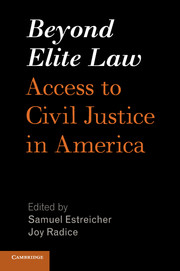Book contents
- Frontmatter
- Contents
- Beyond Elite Law
- Foreword
- List of Contributors
- Overview
- Overview
- PART I CURRENT STATE OF ACCESS TO LEGAL SERVICES
- 1 Access to Civil Justice in America: What Do We Know?
- 2 Life in the Law-Thick World: Legal Resources for Ordinary Americans
- 3 The Need for a National Civil Justice Survey of Incidence and Claiming Behavior
- 4 When Does Representation Matter?
- 5 Self-Representation and the Dismissal of Chapter 7 Bankruptcy Cases
- 6 Racial Disparities in Legal Representation for Employment Discrimination Plaintiffs
- 7 The Unemployment Action Center: A Student-Driven Response to a Legal Need
- 8 Immigrant Representation: Meeting an Urgent Need
- 9 Self-Representation, Civil Gideon, and Community Mobilization in Immigration Cases
- PART II SOURCES OF LEGAL SERVICES ASSISTANCE FOR WORKING AMERICANS
- PART III FASHIONING A REFORM AGENDA
- PART IV CREATING A CULTURE OF SERVICE
- Index
8 - Immigrant Representation: Meeting an Urgent Need
from PART I - CURRENT STATE OF ACCESS TO LEGAL SERVICES
Published online by Cambridge University Press: 05 May 2016
- Frontmatter
- Contents
- Beyond Elite Law
- Foreword
- List of Contributors
- Overview
- Overview
- PART I CURRENT STATE OF ACCESS TO LEGAL SERVICES
- 1 Access to Civil Justice in America: What Do We Know?
- 2 Life in the Law-Thick World: Legal Resources for Ordinary Americans
- 3 The Need for a National Civil Justice Survey of Incidence and Claiming Behavior
- 4 When Does Representation Matter?
- 5 Self-Representation and the Dismissal of Chapter 7 Bankruptcy Cases
- 6 Racial Disparities in Legal Representation for Employment Discrimination Plaintiffs
- 7 The Unemployment Action Center: A Student-Driven Response to a Legal Need
- 8 Immigrant Representation: Meeting an Urgent Need
- 9 Self-Representation, Civil Gideon, and Community Mobilization in Immigration Cases
- PART II SOURCES OF LEGAL SERVICES ASSISTANCE FOR WORKING AMERICANS
- PART III FASHIONING A REFORM AGENDA
- PART IV CREATING A CULTURE OF SERVICE
- Index
Summary
State and federal judges across the country have led innovative initiatives to address civil access to justice problems that they see in their courtrooms every day. In this chapter, Chief Judge Katzmann of the U.S. Court of Appeals for the Second Circuit describes how over 50 lawyers in New York formed a study group to identify and promote ways to improve the level of legal assistance for immigrants. Among the group's successes has been the creation of the Immigrant Justice Corps, which engage senior lawyers working together with recent graduates to provide counsel and representation for immigrants facing deportation or otherwise needing to navigate the American courts and administrative agencies.
Until recently, immigration cases were a very small part of the work of the Second Circuit. In 1999, when I started as a court of appeals judge, the immigration docket was a minuscule percentage of our workload. But within a few years, the immigration docket approached 40% of the case load – and, as a result, our Court developed procedures to manage such cases, devised largely by Jon Newman under the chief judgeship of John Walker. This system continues to this day. Since 2006, We have adjudicated more than seventeen thousand immigration cases. In all too many cases, I could not but notice a substantial impediment to the fair and effective administration of justice: the too-often deficient counsel of represented noncitizens. For immigrants, the stakes could not be greater – whether they can stay in the United States, whether they will be separated from their loved ones, often their children. In all too many cases, I had the sense that if only the immigrant had competent counsel at the very outset of immigration proceedings where the record is made with lasting effect – long before the case reached the court of appeals where review is limited – the outcome might have been different, the noncitizen might have prevailed.
- Type
- Chapter
- Information
- Beyond Elite LawAccess to Civil Justice in America, pp. 135 - 140Publisher: Cambridge University PressPrint publication year: 2016



